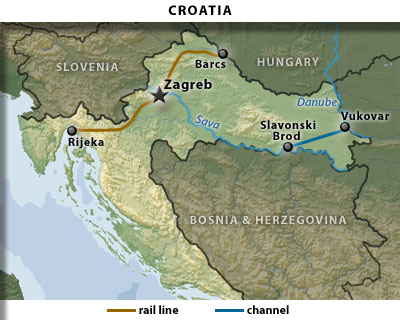Croatia: A 'New Deal' for Transport Infrastructure

February 03, 2006 23 10 GMT
Summary
Croatia will begin an infrastructure-improvement project by the end of 2006 that is ambitious enough to be dubbed the "New Deal" by Transport Minister Bozidar Kalmeta. Consisting of an expansion of railways and waterways, the project will position Croatia as the fastest inland route from Asia to Central Europe. The economically favorable project will solve many transportation problems facing the entire region, such as congested transport in the Bosporus and unstable transport through Serbia. And as Croatia begins its accession talks with the European Union, these projects will further solidify its bid.
Analysis
Croatia will begin an ambitious construction project of rail, road and waterways that will make the country the fastest inland route from Asia to Central Europe -- a plan baptized the "New Deal" by Croatian Transport Minister Bozidar Kalmeta. The projects include a large rail line from Rijeka, Croatia, to Barcs, Hungary; an expansion of the Croatian ports of Rijeka and Vukovar on the Adriatic Sea; and a channel connecting the Danube and Sava rivers.
The economically favorable projects will solve many transportation problems for the entire region, such as congested transport in the Bosporus and the unstable state of transport through Serbia. As Croatia begins its accession talks with the European Union, these projects further solidify its bid.
Croatia is one of the few countries from the former Yugoslav bloc with a functioning economy and no outstanding political issues, making its bid to join the EU as early as 2008 a shoo-in. In addition to furthering Croatia's economic development, these projects will reduce government spending on road projects, increase gross domestic product (GDP) and create many new jobs throughout the nation -- especially in the high-unemployment region of Slavonia, where the channel is to be built. They will also fit in with a shift in EU transportation policies over the past few years from road transport to rail and river due to cost and ecological issues.
The first project is a $740 million channel connecting the Danube and Sava rivers, set for completion in 2013. The channel will begin in the Danube port of Vukovar, cut across Slavonia and connect to the Sava port of Slavonski Brod -- reducing the distance goods must travel between the ports by 259 miles. At present, the Danube and Sava transport only a small percentage of their capacity. Thirty-two million tons a year transit the Danube, though it has a capacity to transport 92 million tons. The Sava river transports under a million tons a year, though it has the capacity to transport 15 million tons. And the channel will have a 12 million ton capacity. The difference in transport capacity between the Danube and Sava rivers will be dealt with by using the port of Vukovar to load containers on smaller ships for transit on the Sava and larger ships for transit on the Danube.
Vukovar, which serves both Croatia and Bosnia-Herzegovina, is already a highly important port. And once the channel is complete -- along with the connecting rail projects -- Vukovar will be even more important as a key port connecting the North, Black and Adriatic seas. Currently, 850,000 tons per year transit Vukovar. After the planned expansion, however, this will grow to 2.5 million tons by 2015 and 6.5 million tons by 2025.
The second segment of Croatia's construction project is a $1.3 billion rail line beginning at the port of Rijeka, crossing the Sava in Zagreb and ending in Barcs. A rail line built in 1873 follows a portion of this route; 5 million tons of goods per year transit this route. The proposed line follows a more direct route that will cut the travel time in half, and will have the capacity to transport 25 million tons a year. The port of Rijeka will begin transporting more than 30 million tons of goods a year, making it one of the most important ports in Central and Eastern Europe -- more than the ports in Trieste, Italy, or Kopar, Slovenia.
Upon the completion of both projects, Rijeka and Vukovar will create a corridor able to cut transportation time from the Black Sea to Europe by a week. Moreover, the new route will solve the European Union's transportation problems through the Bosporus and Serbia. The Bosporus, which links the Black Sea with the Mediterranean, is one of the most-used and most-congested cargo routes from Asia to Europe, resulting in constant delays.
Serbia has also constituted a transport obstruction since the 1999 NATO bombings wiped out most of the infrastructure along its highly used section of the Danube. This included the bombing by NATO of several bridges, which blocked commercial traffic. Debris from the bombings remains, still hindering transport; the bombing also affected sections of the riverbed. Serbia is currently preoccupied with its own political instability as it faces independence referendums from two of its territories, Montenegro and Kosovo. Europe can reopen its transportation routes from the region -- and more securely -- with Serbia's neighbor, Croatia.
For its part, Croatia faces the predicament of financing its large projects, projects due to begin by the end of the year. The planned budget is not entirely out of Croatia's pocket, since the projects will lead to reduced spending on road-building, greatly increased GDP and lower unemployment. And the EU will more than likely step in to aid the investments, if not fully subsidize them, especially since Croatia is expected to join the European Union eventually and the projects reduce EU dependence on outside factors, such as Turkey and Serbia.
http://www.stratfor.com/products/premium/read_article.php?id=261789